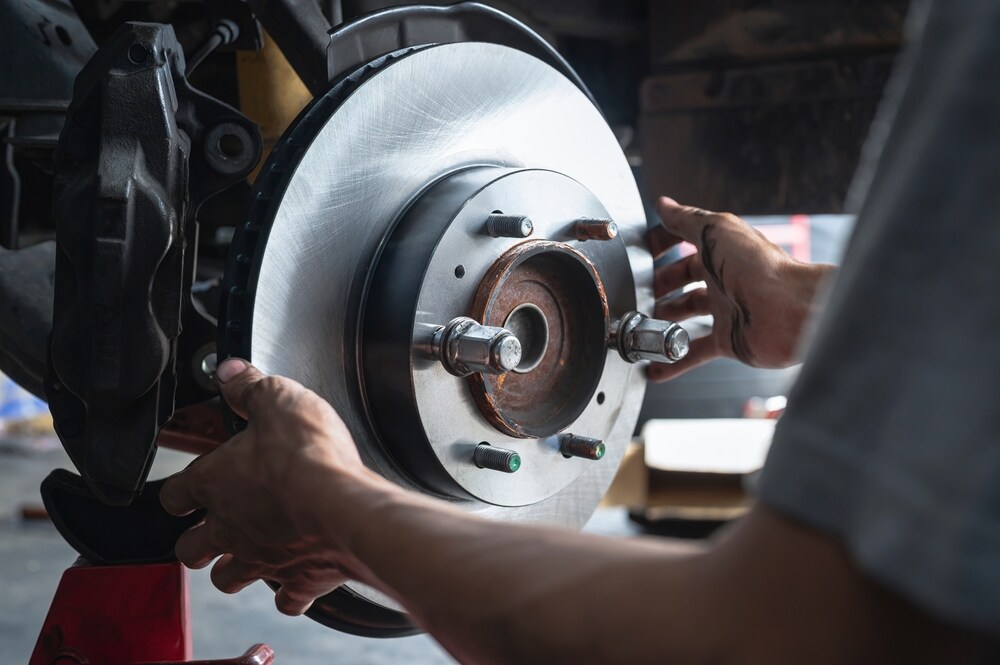
Your car’s brake system is its most critical safety feature, so it’s important to stay on top of maintaining and servicing it. This helps to ensure a safe drive and contributes to the overall performance and longevity of your vehicle.
At Legacy Chevrolet, our Greenwood service center is committed to providing the best brake services in Greenwood, Greenville, and beyond!
When you bring your vehicle to us, we’ll thoroughly investigate and treat the issue to make sure your brakes are in perfect working order.
How do your car’s brakes work and how do you know if you need service? Our experts are here with the answers! Read on to learn more!
Understanding Your Car’s Brake System
According to the National Highway Traffic Safety Administration (NHTSA), faulty brakes account for 22% of accidents, making it the second leading cause of collisions.
Since faulty brakes make up such a large percentage of accident causes, let’s take a look at how the system works so you can better understand when and why you might need repairs.
- Brake rotors are the metal discs attached to the wheels. The brake pads press against the rotors, creating friction that slows down the rotation of the wheels. This is what stops your car.
- Brake pads rub against the rotors. Because of this, they wear down over time and need to be replaced. The frequency with which they need to be replaced depends on your driving habits. Typically, you should aim to replace them every two to seven years.
- Calipers hold the brake pads and pistons.
- Brake fluid transfers the strength of your foot on the brake pedal to the brake components. Like motor oil in your vehicle, you need to change your brake fluid to ensure it is clean. Aim to do this every 24,000-30,000 miles, or every two years.
- Brake lines are the tubes that transport brake fluid and pressure from the brake master cylinder to the wheel cylinders and calipers. Damage to the brake lines will significantly impact your braking performance.
So, how do all of these components work together? When you press the brake pedal, several events occur simultaneously within a second. Your foot on the pedal pushes the brake fluid through the master cylinder and into the brake lines. This pressure causes the calipers to press the brake pads against the rotors, creating friction. This friction slows the rotation of your wheels, stopping the vehicle.
Signs You Need Brake Service
One of the best things you can learn about your vehicle is how to spot the signs that you need brake service. Being aware of–and fixing–issues when they arise will help you avoid more expensive repairs or even accidents.
With that in mind, here are some things to look out for:
- Squeaking or squealing noises, which are typically a sign that the brake pads are getting thin and should be replaced.
- Grinding sounds usually mean that the brake pads are completely worn out and might be damaging the rotors.
- Vibrating or pulsating may mean your rotors are warped or there are issues with your brake calipers.
- Longer stopping distances may indicate an issue with your brake pads, fluid, or other components. We recommend getting this checked out as soon as possible.
- The brake warning light is the most clear indicator that there is an issue within the brake system. This also means that your brakes need immediate attention.
Taking care of these signs as quickly as possible can help prevent more severe damage and ensure your vehicle is reliable. Staying proactive can save you money and preserve your peace of mind!
Schedule Greenwood Brake Service Today!
When it comes to car brake repair, trust only the best Chevrolet service! At our Greenwood brake service center in SC, we pride ourselves on delivering top-notch service with the highest quality Chevrolet parts in Greenville.
Schedule brake service with us at Legacy Chevrolet today and hit the road with confidence!
Don’t forget to take advantage of our Chevy service specials to save money on Chevrolet repairs!